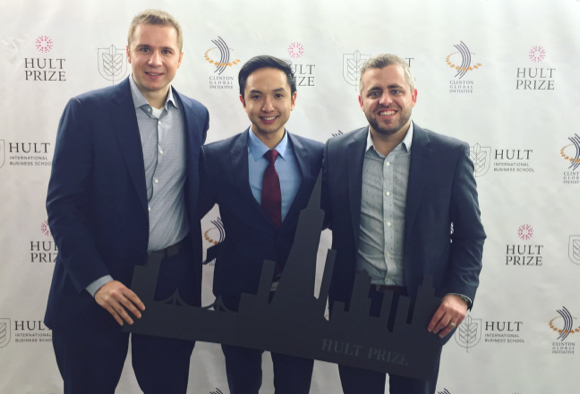Hult Prize Regional Competition
March 17, 2016

The Hult Prize is the largest international competition for social impact and is hosted by former US President Bill Clinton and the Hult School of Business. Each year there are over 25,000 applicants. The top 60 teams are then selected into each regional final in Boston, San Francisco, Dubai, Shanghai and London.
This year we, David Camia, Thomas Horvath, and Johnnie Vu, all AMBA ‘2016 students, represented Smith School of Business, Queens University, at the regional finals in San Francisco.
It was an incredible experience to meet some of the brightest minds from many universities from all corners of the world including, Mexico, Australia, China, Kenya, Russia and many other cities. We were very impressed with the diversity of the students that we met.
The competition started on Thursday night where we all registered. The competition commenced with the opening ceremony by the Regional Director of the Hult Prize San Francisco, followed by keynote speakers, including the Founder and CEO of the Hult Prize, our head judge a VP from Capgemini and the founder of the Unreasonable Institute, a social entrepreneurship incubator. The evening ended with our team preparing for the competition.
The next morning was game time. The 63 teams were divided into 6 divisions. The winner of each division would move into the final round. There was an impressive judging panel which included many CEOs from top tech companies and the Chief Learning Officer from Nike. In summary, our idea revolved around solving the issue of open defecation and sanitation in India, which would save the government billions of dollars in health costs. Although we awed the crowd, presented with passion, and received confirmation from the judges later that we were among the top contenders, our team did not move to the finals.
This has truly been an incredible learning experience. It allowed us to put into practice everything that we acquired from our MBA. During the process we realized the difficulties of trying to solve world problems and creating a social impact. Also, it allowed us to see firsthand that issues are perceived differently depending on an individual’s cultural background and hence the importance of having diversity in any team trying to resolve a global issue.
We would like to thank the Smith School of Business for providing us with the opportunity to experience this journey and Micheal Darling and Tina Dacin for being available to provide us with their feedback and advice.
David Camia, AMBA ‘ 2016
Thomas Horvath, AMBA ‘ 2016
Johnnie Vu, AMBA ‘ 2016